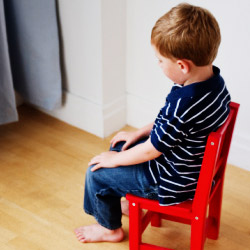When Connor was little, I remember trying to implement time-out when he was naughty. See, Super Nanny said that you would have to put them back in the time-out spot, over and over, until they stayed, and you had to be consistent with it or they would never learn.
For two solid hours, I repeatedly put Connor back in his time-out spot, only to have him immediately jump right back up again. My lower back muscles were screaming, and there was an endless loop of verbal abuse playing in my head. “Super Nanny said you have to stick with it, or they win. How much do I suck as a mom when I can’t get my three-year-old to comply after two hours? I’m failing miserably, why won’t this work?”
It all made sense, a year later, when we received the diagnosis. And yet it’s still so easy to slip into the mindset of “why can’t I make my kid behave?
We’ve come a long way, and understand so much more, but that doesn’t mean we don’t still make those same mistakes almost every day. As hard as it is for us, as the parents, it is even harder to get others to understand positive behavioral support, and harder still to get them to follow it.
Last week, I arrived to pick up Connor from the after-school program. He was sitting in the time-out chair. The director told me that he was having a great day, and they rewarded him with being line leader when coming back from recess, and holding the door open for his friends to enter the cafeteria. While holding the door, with his backside against it, he bumped the door back and forth with his butt. Before she could catch up to him to tell him to stop, he bounced it enough that the tension lever at the top broke. The vice principal was called, and he came to take a look at it so he could call someone to fix it. And Connor sat in time out.
In a voice so low it was almost a whisper, I told her I didn’t agree with the time-out. He was rewarded for good behavior, then he did something that wasn’t malicious, or meant to cause harm, and was punished for it. He was punished for an accident. If it had been me, I explained, I would have enrolled him in being part of the solution, and asked him to help by talking to the vice principal about how to get the door fixed. End of story.
And then I said, “we’re damaging this child.” Her eyes got big, and we both turned to look at Connor, sitting at a table about 15 feet away, and he was sobbing uncontrollably. Tears welled up in the director’s eyes.
We left and Connor had a 40-minute meltdown of hysterical crying. As much trouble as he gets into, as often as he refuses to comply with directions, as often as he is lippy and sassy, he was so hurt and crushed by what happened because it was an accident. It was an innocent playful thing that he did, that we’ve all done at one time or another, and it quickly escalated into yet more punishment.
And yet again, I feel powerless. No matter how much information I come armed with, no matter how many times I explain positive reinforcement, it doesn’t matter if they don’t use it. I’m acutely aware that the program isn’t staffed for providing intensive, direct support for one child. But I’m still left with the question that if 1 in 88 kids are diagnosed on the spectrum, why don’t programs recognize that and staff accordingly?
It seems like putting my child in a “special” care situation is the only alternative, and probably the preference for staff that would rather not deal with the challenge. But if my son was in a wheelchair, I can’t help but think that he would be accommodated.
When it comes to academics, the school pushes for him to learn, keep up, follow the rules, master the routine, because he needs “to learn it now because he will be in school for many more years.” But when it comes to being part of the group in a social context, there is no emphasis on supporting him in the appropriate way to prepare him for later years.
The school year is drawing to a close in a few weeks. I could look for other after-school options for next school year, but I think we will continue in the same program. If I want integration and inclusion to be more than just words, I have to keep showing up every day…like ABA, perhaps my consistent, positive approach will eventually reap results.
Because I know my kid won’t be the last one with challenges to be in their program. There will always be another.
.


